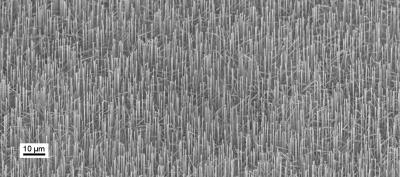Dec 6 2013
Thread-like semiconductor structures called nanowires, so thin that they are effectively one-dimensional, show potential as lasers for applications in computing, communications, and sensing.
 This micrograph shows a forest of III-V semiconductor nanowires standing, as grown, on a silicon substrate. Credit: WSI/TUM
This micrograph shows a forest of III-V semiconductor nanowires standing, as grown, on a silicon substrate. Credit: WSI/TUM
Scientists at the Technische Universitaet Muenchen (TUM) have demonstrated laser action in semiconductor nanowires that emit light at technologically useful wavelengths and operate at room temperature. They now have documented this breakthrough in the journal Nature Communications and, in Nano Letters, have disclosed further results showing enhanced optical and electronic performance.
"Nanowire lasers could represent the next step in the development of smaller, faster, more energy-efficient sources of light," says Prof. Jonathan Finley, director of TUM's Walter Schottky Institute. Potential applications include on-chip optical interconnects or even optical transistors to speed up computers, integrated optoelectronics for fiber-optic communications, and laser arrays with steerable beams. "But nanowires are also a bit special," Finley adds, "in that they are very sensitive to their surroundings, have a large surface-to-volume ratio, and are small enough, for example, to poke into a biological cell." Thus nanowire lasers could also prove useful in environmental and biological sensing.
These experimental nanowire lasers emit light in the near-infrared, approaching the "sweet spot" for fiber-optic communications. They can be grown directly on silicon, presenting opportunities for integrated photonics and optoelectronics. And they operate at room temperature, a prerequisite for real-world applications.